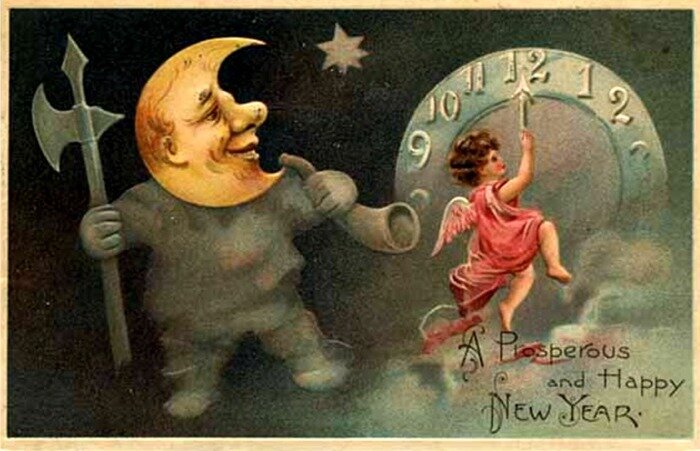Goodbye, 2019; hello, 2020! It’s a new year, and a new decade. The possibilities are endless. Adventure awaits. But before we jump into the new world, Fiction Unbound contributors are taking a moment to look back at some of our favorite posts from past years—the best, the most thought-provoking, the most fun, and the stories that continue to haunt our dreams.
CH Lips: “Black Leopard Red Wolf: A Knife to the Neck of Genre and Gender Tropes”
Of all the books I’ve reviewed for Fiction Unbound, Man Booker-winner Marlon James’s first venture into fantasy writing is my favorite. The novel is gorgeously lyrical and the plot defies expectation, breaking all the stodgy rules of the typical three-act, heroic journey. The characters are rich, interesting and intricately flawed. Taking a deep dive into this story was a true joy—it was like following a treasure map, uncovering the secret motivations of the complicated, violent antihero, Tracker. This novel was a finalist for the 2019 National Book Award for fiction. If you haven’t read it yet, put it on your must-read list for 2020.
Lisa Mahoney: “Revive the Grendel’s-Mother/Female-Warrior/Mother Archetype, Please!”
This post about the continuing reliance of the orphaned-hero/heroine trope in speculative fiction made me question how I use backstory in my own writing, and it shone a bright light upon this common shortcut that writers employ to quickly introduce high-stakes conflicts for their characters. In traditional fairy tales, orphans are endangered because they lack protectors, but in our modern world, in most countries, society will take care of them. Why then do we continue to downplay the importance of parents to teenagers, and why are mothers in particular seen as so unimportant in childrearing when we all know they do the vast majority of it, everywhere?
Theodore McCombs: “No More Yielding but a Dream: Sandra Newman’s The Heavens and the Progressive Vision”
In a year in which I had the honor (and immense pleasure) of reviewing new books by Sarah Pinsker, Carmen Maria Machado, and Ted Chiang, how could I possibly pick my favorite post? These are titans of speculative fiction, minds whose geniuses are practically national resources. Still: the post I’m proudest of, about the book I can’t get out of my head, was “No More Yielding but a Dream: Sandra Newman’s The Heavens and the Progressive Vision.” Newman’s novel is a literary dynamo with a premise so pulpy, you’d expect it in a Dr. Who or Twilight Zone episode: Kate, a New Yorker in 2000, regularly dreams a life as the Dark Lady of Shakespeare’s sonnets; upon waking, she finds her actions as an Elizabethan courtesan have altered her present—and not for the better. But Newman takes this premise to such ambitious heights, and with such depth of moral and social vision, the result is an astonishing success of storytelling and speculative inquiry. “The Heavens is all about our suspicion of th[e] progressive vision,” I wrote, “the fear that, any time we try to engineer humanity into something better than it is, we only make the problem worse. … [It’s] a daring and brilliant piece of speculative literary fiction, and a thoughtful, timely, and unnerving meditation on what it means to hope against hope.” Nearly a year later, I feel just as thoughtful and unnerved.
Danyelle C. Overbo: “LeVar Burton Reads Speculative Fiction”
When my fellow Fiction Unbound editor, Amanda Baldeneaux, suggested we listen to LeVar Burton’s podcast where he reads short fiction to his audience, I wasn’t sure I wanted to dig in. I’m not huge on audiobooks, but I love LeVar Burton. I’m so glad I took the leap, because this couldn’t be a more perfect vehicle for the former Reading Rainbow book guru. If you are like me and have trouble fitting quiet reading time into your busy life, this is the podcast for you. Our post goes into a few of the stories, and I loved the homework for this one. This is definitely one of my favorite Fiction Unbound assignments.
C.S. Peterson: “The Wild, Raging Girl”
For me, the series of posts that haunted the past decade all centered on the trope of the wild, raging girl—a character whose experience of a moment becomes her forever. It started with a post on the character of the “girl who is wild, raging, but silent” that I kept running across in the books I was reading. Author Lani Taylor explored this character in depth in her duology of Strange the Dreamer and Muse of Nightmares. Taylor said she was “tired of killing” being an easy answer to a story’s conflicts, so she set out to build a world where there are no easy answers for characters caught in intergenerational trauma. In Taylor’s books, Minya, an eleven year old girl, is trapped by one horrific moment, “and because she has no way out of that moment, neither does anyone else in the story.” Complexity is overwhelming and simple answers feel deceptively safe. As we move into a new decade I hope for more stories that entertain while braving the complexity and contradictions of all our worlds, real and imagined.
Mark Springer: “Thomas Ligotti and the Derangement of Creation”
I’ve long believed horror stories help us make sense of a world that is often more terrifying than we’d like to admit. By confronting our deepest fears through tales of supernatural horror, we empower ourselves to deal with the all-too-real pain and suffering we encounter in everyday life. Not all horror writers aim to make the world more bearable, however. Thomas Ligotti, whose stories are as unforgettable as they are unsparing, uses the genre to paint a darker picture—one in which the universe itself is fundamentally disordered, existence is a nightmare, and consciousness is a curse. What could be more terrifying than that? Ask me again in November, after the U.S. presidential election results are in.





































We’re almost done with this, um, interesting year. That in itself is cause to celebrate. (photo credit:Patrick A. Mackie)